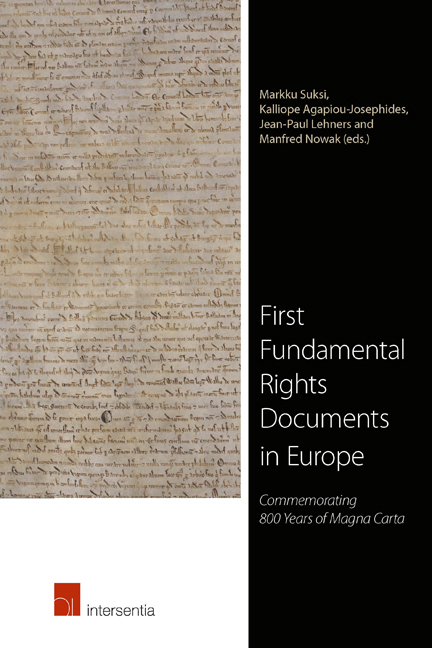Book contents
- Frontmatter
- Preface
- Contents
- List of Authors
- 1 Introduction
- PART I
- PART II
- 11 France: Foundational Importance of the Declaration of 1789
- 12 Sweden: Free Press as a First Fundamental Right
- 13 The Netherlands: The Batavian Staatsregeling as the First Fundamental Rights Document
- 14 Portugal: ‘Tropical Versailles’ in the Beginning of the Nineteenth Century
- 15 Luxembourg: Fundamental Rights in a Small State
- 16 Greece: Reflections from the Hellenic Legal Tradition
- 17 Denmark: In Love with Tradition
- 18 Germany: Fundamental Rights as an Instrument Towards the Rechtstaat
- 19 The Czech Republic: On the Road to Rights and Freedoms
- 20 Romania: The Birth of Fundamental Rights as a Form of Political Contention
- 21 Bulgaria: The Liberal Tarnovo Constitution
- 22 Finland: Rights to Facilitate Participation
- 23 Estonia: First Landmarks of Fundamental Rights
- 24 Slovakia: The Right of a Nation
- 25 Latvia: Second Part of the Constitution as a Project for Next Generations
- 26 The History of Fundamental Rights in Europe: A Long and Winding Road
- Index
19 - The Czech Republic: On the Road to Rights and Freedoms
from PART II
Published online by Cambridge University Press: 15 December 2017
- Frontmatter
- Preface
- Contents
- List of Authors
- 1 Introduction
- PART I
- PART II
- 11 France: Foundational Importance of the Declaration of 1789
- 12 Sweden: Free Press as a First Fundamental Right
- 13 The Netherlands: The Batavian Staatsregeling as the First Fundamental Rights Document
- 14 Portugal: ‘Tropical Versailles’ in the Beginning of the Nineteenth Century
- 15 Luxembourg: Fundamental Rights in a Small State
- 16 Greece: Reflections from the Hellenic Legal Tradition
- 17 Denmark: In Love with Tradition
- 18 Germany: Fundamental Rights as an Instrument Towards the Rechtstaat
- 19 The Czech Republic: On the Road to Rights and Freedoms
- 20 Romania: The Birth of Fundamental Rights as a Form of Political Contention
- 21 Bulgaria: The Liberal Tarnovo Constitution
- 22 Finland: Rights to Facilitate Participation
- 23 Estonia: First Landmarks of Fundamental Rights
- 24 Slovakia: The Right of a Nation
- 25 Latvia: Second Part of the Constitution as a Project for Next Generations
- 26 The History of Fundamental Rights in Europe: A Long and Winding Road
- Index
Summary
INTRODUCTION
The manner in which respect for the catalogue of fundamental rights has evolved is a fascinating historical topic whose roots reach far back through time (longue durée). Its evolution is fascinating both as regards the abstract argumentation that has formed the human rights agenda — or more precisely, in the historical context, the agenda of rights and freedoms — and as regards the practical efforts that have been undertaken to meet this agenda. These two aspects have been apparent throughout the lifetimes of two developmental types of state. The first of these types is the medieval state, the regnum or imperium; the second, the modern national state. Both types are key terms of reference in the topic area, and each has naturally been represented by the institutions, actors, social and economic characteristics, and types of conflict and resolution peculiar to it. But this has meant that the key spheres of analysis that belong to the topic — the legal and the political spheres — have not always proceeded in parallel, but rather in a contradictory, conflictual manner.
The concise introductory notes given here aspire to general validity. But they also logically reflect the facts of Czech legal history, more particularly, the country's political history, which forms the core data of the text. Within Czech history, there is no extraordinary historical act comparable to Magna Carta Libertatum, not factually and not symbolically — no document whose anniversary may be celebrated by this collective monograph. This does not mean, however, that the topic of rights and freedoms is absent from Czech history, and this makes the question of why the Czechs never produced any similar document to Magna Carta that much more interesting. It is for this reason that the processual aspect outlined in the introductory paragraph is so important:
the appearance and disappearance of rights and freedoms as a topic and the success or lack thereof in gradually trying to anchor these concepts institutionally must, in the Czech case, be studied as they unfold over time.
What is written here therefore does not focus on a single moment in Czech history that is somehow exceptional, even if it does include a micro-study the authors considered typical for the same.
- Type
- Chapter
- Information
- First Fundamental Rights Documents in EuropeCommemorating 800 Years of Magna Carta, pp. 235 - 250Publisher: IntersentiaPrint publication year: 2015



